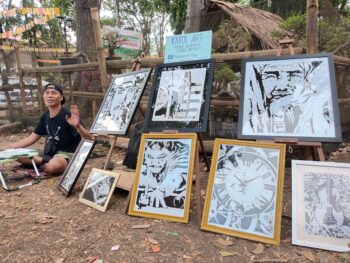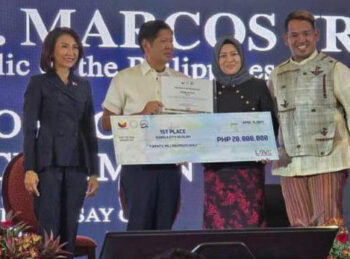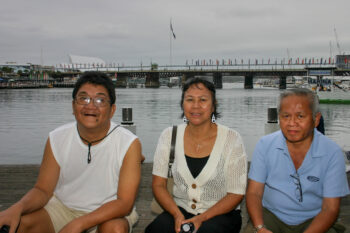QUEZON CITY (MindaNews / 5 March) – As we stumbled on the idea of fitrah to mean pattern or natural order as our way to reflect on President Barack Obama’s reminders for anyone not to ride on the high horse of Crusades amid the intensity of violence in many parts of the Middle East, I thought there is a need to make some clarifications.
My perspective in our earlier khutbah (discourse) may be misconstrued as contradictory when we say that history has been punctuated with violence since the beginning of time, as we noted the angels’ seeming protestation in the creation of man as vicegerent (khalifah) including the quarrel of the two sons of Adam (AS) – Habil and Cabil. This is not to mention the series of devastating wars, the most ironic of which was the Crusades.
We thought there is a need to further reflect on this subject to avoid being misconceived as contradictory.
Optimism on life
Indeed, if we read the Qur’an or certain verses therein in solation, then we might be prodded to carry the view that the angels’ seeming protestation on man being placed on earth speaks of the violence that happened in history. Yet, if we read the succeeding verses in Suratu l-baqarah immediately after the angels’ expression of protest, it is very clear that the Qur’an emphasizes optimism; thus, the angels’ perspective about man including their forecast of the violence and mayhem man would do on earth is countered when the Qur’an says:
He said: “I know what ye know not (Baqarah: 30).”
And the Qur’an continues:
“And He taught Adam the nature of all things; then He placed them before the angels, and said: Tell Me the nature of these if ye are right (31).”
This point of the Qur’an speaks about the edge of man over angels. It is only Adam (AS) and thus his progeny who are given the power to understand “the nature of all things.”
As the angels failed to name “the nature of things,” what they could do was rendered their praise, as they did not know anything except that which Allah (SWT) allowed them to know. The succeeding verse reads:
“They said: ‘Glory to Thee: of knowledge we have none, save what Thou has taught us: in truth it is Thou who art perfect in knowledge and wisdom (33)’.”
If we read thus the Qur’an in isolation, the angelic perspective about man might prod us to take a very pessimistic view about life, as it is reflective, as we said, in today’s dominant psychology like Freud’s concept of thanatus or “culture of death” in modern society. It is a very grim view of the world.
Yet, the Qur’an gives us the reverse view: that is – the sense of optimism and the need to embrace life, despite the propensity of war and violence happening since then until our time.
So, we thought this view of the Qur’an taken not in isolation gives us a comprehensive view about life and the rationale why we have to embrace positive outlook and to be optimistic of our history including our future.
Disposition of goodness
Moreover, when we speak of fitrah we thought that it is an innate disposition of goodness both in creation and human being, suggesting thus that any form of violence and war like those during the period of the Crusades is not in accord with fitrah.
President Barack Obama refers to those who would possibly ride their high horses of Crusades as a tendency – a “sinful tendency” – in man to go beyond the natural order of things or we say the fitrah.
We partly agree with this notion of “sinful tendency,” as it is very closed to the Qur’anic concept of nafsu l-ammara or commanding soul. For instance, in Suratu l-yusuf, the Qur’an says: “the human soul is certainly prone to evil (53).”
We have touched a number of times this subject. In fact, we’d detailed a kind of level or hierarchy as far as the concept of soul is concerned: from lowest to highest aspects of the soul. The nafsu l-ammara or the commanding soul is that which is the lowest part of the human spirit, while the highest one is the nafsu l-mutmainnah or the soul at peace.
We said man is perpetually gripped by these forces: one that which brings him to effect a carnal, animalistic character; the other brings him to that of the highest or soul at peace.
So the notion of “sinful tendency” is thus partly innate in man. There are no individuals like angels. As we said, man treads in this moral pendulum that swings from high to low.
Thus, fitrah is subjected into a, for lack of better term, “pendular” dynamic. It is not something static like the state of the angels or animals. The fitrah in man operates in these dual forces inherent in him.
The mix of tendencies to sin, if we take President Obama’s term, including its reflection in human action and other forms of social vociferation like conflict and war could be viewed as our inability to bring back our emotions into their normal state, which is the supposed constant feature of fitrah. Hence, in psychological terms, certain type of emotions could overwhelmingly cloud mercy and compassion and reify hate and anger that oftentimes lead to violence and war.
This in our view on the reason why it took centuries for supposedly men of faith in both camps – that is, from Islamdom and Christendom – to slug it out making, we said, religions appeared contradictory, as these were used as justification for violence and war.
So, this is in our view the way we qualify our notion of fitrah and the reason why there is actually no contradiction in the way we presented if we read pertinent verses in the Qur’an not in isolation.
Oriental trade
We said, too, the underside of the Crusades, despite its rather grim effect is the opening of the East to the West and the eventual evolution of what becomes as Oriental trade. Through the Crusades, Europeans were practically animated with the Orient as sources of exotic food, spices, and so on.
Thus, if we take history on its whole the Crusades serves certain function in terms of the flourishing of commerce and trade and the beginning of cultural exchange between the East and the West. So what appeared to be negative like the violence and mayhem of the Crusades created actually positive effects inlongue durée resulting into the birth of so-called Oriental trade.
There is thus an underlying “mystery” in history – a view or an ability and attitude that we have to be a bit alert always as ibra or lesson could come in certain ways.
For instance, in the work of Joseph De Somogyi it reads:
“Livelier trade contacts between Christianity and Islam were, in addition, also indirectly furthered by the political disintegration of the Abbasid Empire. In the 11th century its power was already on the wane. The most potent commercial competitor of the Abbasids was the Spanish Umayyad Caliphate, founded as early 754 by the last Umayyad, Abdurrahman, who had to flee to Spain. During the 8th century, Muslims had conquered and for seven centuries firmly held sway over South and Central Spain. The Spanish Arabs developed the economic life of the Iberian Peninsula to a level never before or since reached in that peninsula. They introduced into Spain a number of plants and fruits, the Arabic names of which suggest their provenance. Such are rice (Ar. aruzz), cane-sugar (sukkar), cotton (qutn), saffron (za’faran), oranges (naranj), apricot (barquq), peaches (durraq), promegnate (rumman), and olives (zaiton). “ (p. 65)
These are the contribution of the Arabs in the Iberian Peninsula before the Inquisition. It has immense implications in the advent of Spanish colonialism in the Philippines as relatively similar process happened with the formation of “Islamic heritage” in the country.
Somogyi continued:
“How extensive was Arab supremacy on the sea in the Middle Ages, is evident from a number of Arabic loan-words in English and other European languages, like admiral (Lord of the Sea), arsenal (the house of craft), average (in the sense of duty upon goods), cable, corvette or war vessel, shallop or sloop, barque, carrack, cheque, tariff.” (p. 66)
These are Arabic loan words that have become part of European and English day-to-day languages. Thus, the Crusades or particularly the Inquisition could not simply be viewed as negative. It has, among others, facilitated the opening of Islam and Islamic civilization in other parts of the world since the days of old.
Fitrah and nafs
There is a hadith (Prophet’s saying), which is very familiar to many of us regarding the natural state or fitrah in human being like a baby. It reads:
“No child is born except in a state of fitrah, then his parents make him a Jew or a Christian or Zoroastrian, just as each animal produces a perfect animal like itself – do you see any among them that are born mutilated?”
It is very interesting that the hadith speaks of fitrah as far as human being is concerned including also the fitrah in animals. Thus, there is convergence of natural state in both human being and animals, and if you may, creation. It is the reason why, we said, creation is in perfect harmony. There is order in it. There is an inherent system embedded in creation.
Even before a child is made to embrace a new faith, that fitrah is already innate in him or her. Fitrah is of highest nature, as it is originated in the word kun (Be!). The Qur’an says:
“To Him is due the Primal origin of the heavens and the earth: When He decreath a matter, He said to it: “Be.” And it is (Baqarah: 117).”
Fitrah thus is imbedded in the essential concept of “kun.” It is of highest value. There are relatively similar concepts related to fitrah that means or implies creation or in its verbal form “to create.” Yusuf Ali did a beautiful exploration by delineating the concept of fitrah that comes from Arabic word fatara with other terms like bada’a, khalaqa, ja’ala, sawwa, and bara’a. These are Qur’anic etymologies that have significance in the notion of creation.
What is interesting is that, the notion of fatara implies according to Yusuf Ali as “the creation of primeval matter to which further processes have to be applied later, as when prepare dough but leave the leavening to be done later.”
In this connection, there is that element that is subject to dynamic process of nafs particularly in man especially in matters of choice or in determining what is right and what is wrong; thus, allowing an individual to tread either to nafsu l-mutmainnah (soul at peace) or nafsu l-ammarah (animalistic or commanding soul).
We say therefore that Obama’s notion of sinful tendency reflects or is explainable in the moral pendulum of nafs, suggesting that one cannot simply blame, say, from Muslim perspective, the Crusaders why there was that grim episode of human history, which is the Crusades and vice-versa. Violent tendency is innate in every person.
As we said, it is an irony: it is only when man reaches the peak of his folly where he realizes the need to embrace what is normal or fitrah. It is the reason why, we said, that the Crusades for many centuries had to end because that is not in accord when human fitrah.
Phantom of Crusades
What is alarming in our time is that seemingly humankind never learned. The shadow or ghost of the Crusades continues to haunt many parts of the world like the Middle East.
In fact, as President Obama speaks in restraining people not to ride on the high horses of Crusade, fact is, big powers are busy imposing control in places like the Middle East appearing therefore that the phantom of the Crusades persists.
It is quite interesting when President Obama spoke on the need to abhor anyone to ride on the high horse of Crusades; yet, it was also the time when the United States sent arms shipment to Lebanon containing what many would consider as junk war materials. And it is not only the US that is pouring arms and ammunition into that hot spot of the Crusades of old. Practically, all big powers today are engaged in arming countries and movements in the Middle East and other parts of the Muslim world.
Therefore, while the Crusades has already ended centuries ago, today, we are seeing new ghost of Crusades with big powers practically pulling the strings from above of every country under their control. In a sense, today’s ghost is even worse than the Crusades.
In fact, if we take the entry of Turkey into the Concert of Europe in the 19th century as the beginning of the Muslim world’s acceptance of the nation-states system, we could say now that until our time, that it is almost similar in duration of the Crusades.
So we say it is not nice to simply restraint people not to ride on the high horses of Crusades; rather, big powers should search their conscience not to repeat the same follies of the past.
We have talked about, for instance, the new round of Cold War where big powers are involved in promoting their own interests, as they are spreading machines of war in many parts of the world.
Apart from the proliferation of nuclear weapons where many countries in the Middle East are now developing or planning to develop, statistics show that big powers remain the largest exporters of major conventional weapons in many countries. It is consistent from 2004 to 2013; statistics have not changed except for China that entered into the scene two years ago.
Today, world ranking remains with the United States as the number one exporter of major conventional weapons accounting around 30%, Russia 24%, Germany 10%, France 9%, United Kingdom 4%. Then China came in with around 6%. Incidentally, recipient countries of these arms are generally Muslim countries like the United Arab Emirates, Bangladesh, Pakistan, Algeria, and others.
What we are saying is, the ghost of the Crusades remains, except that there are now new war methods and instruments beyond horses and swords. In our time, war materials have become very sophisticated; yet, what are actually given to Muslim countries are junk materials. So that even when they need them, these would not be of much use during actual war.
This is our way to reflect on the call to restrain nations not to ride the high horses of Crusades. We thought this message is more apt to start with big powers themselves. At least, during the Crusades, the Saracens and the Crusaders simply used swords and arrows and so on. In our time, mere push of a button, say, of nuclear weapons, would not only endanger certain areas or regions like the Middle East but the Planet Earth no less.
[MindaViews is opinion section of MindaNews. A khutbah (with some revision) delivered at the UP-Institute of Islamic Studies on 27 February 2015. Julkipli Wadi is Professor of Islamic Studies, University of the Philippines.]







